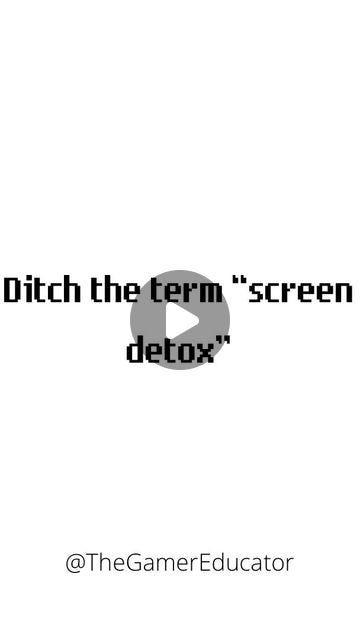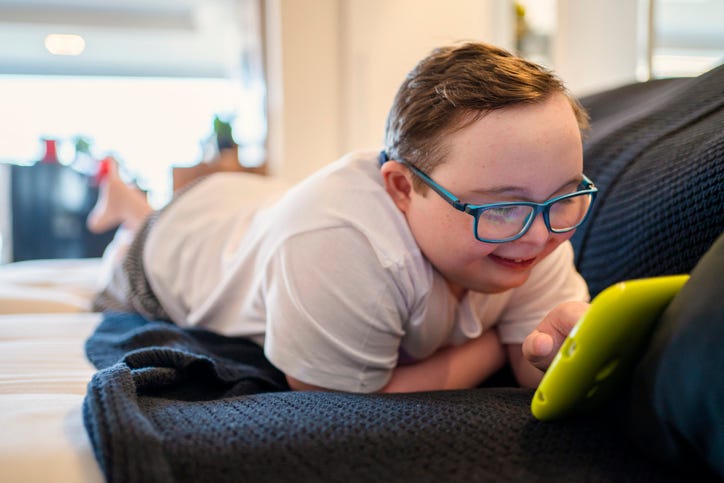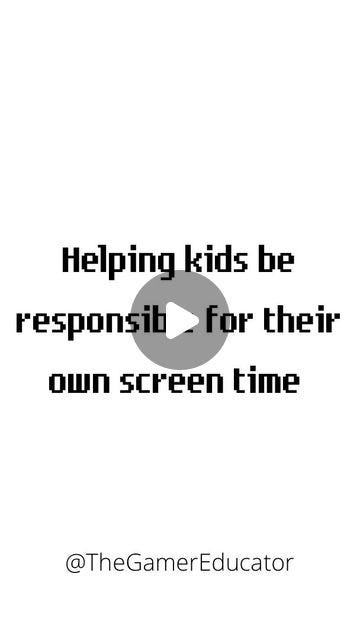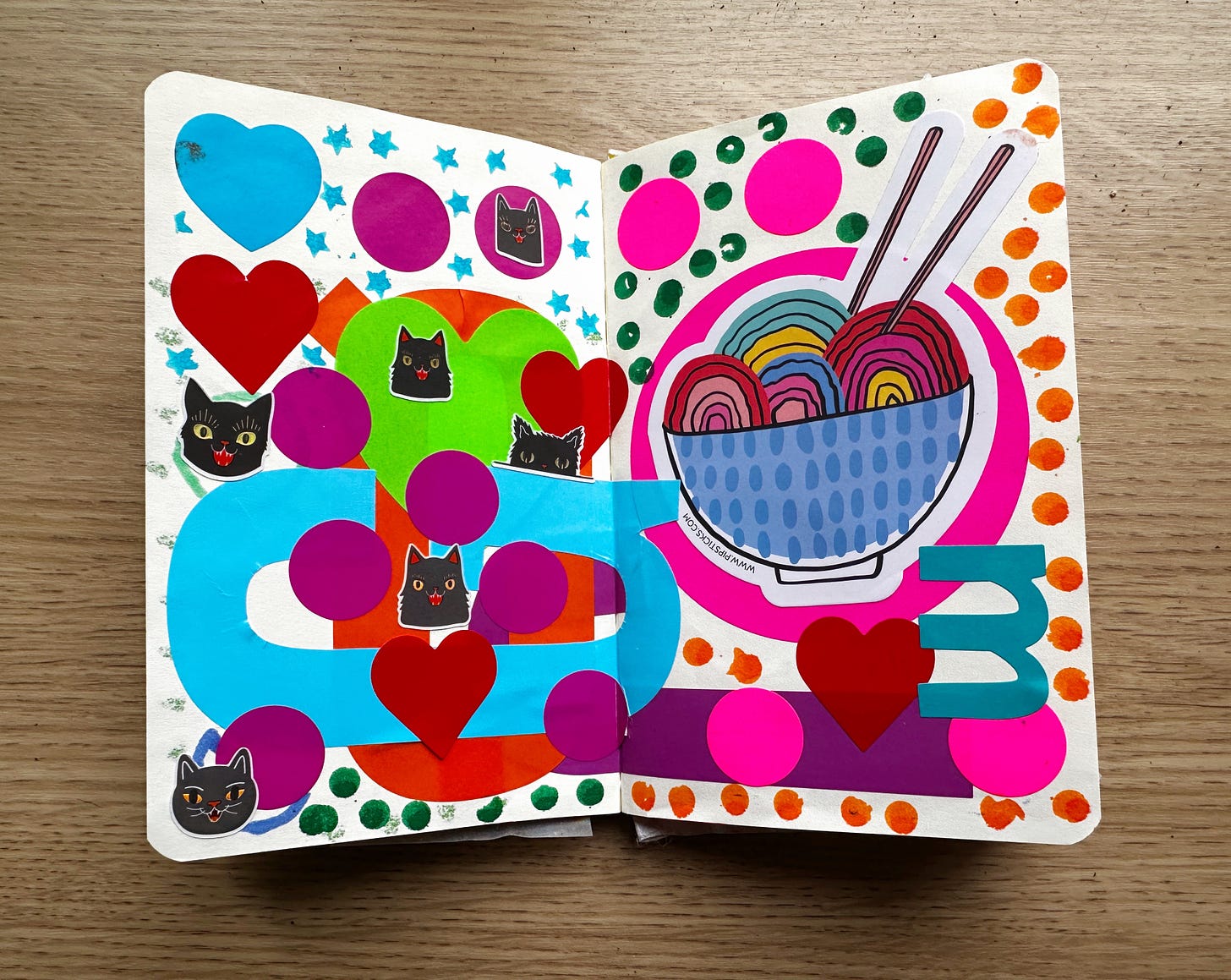You’re listening to Burnt Toast! This is the podcast about anti-fat bias, diet culture, parenting and health. I’m Virginia Sole Smith.
Today I am chatting with , a middle school teacher librarian better known as The Gamer Educator.
Ash has over a decade of teaching experience, and uses their love of video games to connect with their students and enhance student learning in the classroom. On Instagram as @thegamereducator, Ash helps caregivers navigate screen time boundaries, to ensure it benefits the whole family. I turn to Ash’s work whenever I am feeling panicked about our family’s relationship with screen time. So, heads up that this whole episode is a little bit of a therapy session for me—but I think you’ll get a lot out of it too! Yes, even if you don’t have kids. Because we’re going to talk about how screen time attitudes can intersect so much with diet culture and anti-fatness. And as usual, there’s a lot of unlearning we can all do.
If you’re enjoying the podcast, make sure you’re following us (it’s free!) in your podcast player! We’re on Apple Podcasts, Spotify, Stitcher, and Pocket Casts! And while you’re there, please leave us a rating or review. (We like 5 stars!)
Episode 128 Transcript
Virginia
So, I want to disclose going into this that I’m a parent who regularly panics about screen time. I’m trying. But I’m on my unlearning journey.
Ash
Well, what’s very funny is that I could say exactly the opposite. Like, I’ve tried to do so much unlearning around food and the associations I have with food and eating to make sure I’m raising my kid very differently than my upbringing. And I’m still not there yet for myself. So we’re coming from different sides, but—
Virginia
It’s very much the same conversation.
Ash
Oh, very much. Yes.
Virginia
I do want to report one victory, which is: This weekend I spent three hours watching my 10-year-old play Animal Crossing, and it was really good for both of us. We’re at an age where there can be a lot of tween feelings. So we had a morning while her sister was on a playdate and I decided to just really go down the Animal Crossing rabbit hole with her. And she was so thrilled!
So, that was a helpful homework assignment I gave myself, in anticipation of the conversation.
Ash
Well done! Some exposure therapy.
Virginia
You posted a reel recently about the problems with the term “Screen Time Detox,” and I was like, Oh, okay. Ash needs to come on Burnt Toast. Screen time diet culture is a thing! We need to get into this.
Ash
I should say, probably the go-to analogy I use most often when talking about screens is food. I make food analogies all the time.
So, screen detox is a term that we see a lot, particularly from screen time platforms that are not necessarily neutral about screen time. Maybe they’re saying that they’re neutral about screen time, like, “oh, screens are a tool,” but as soon as you start involving words like “screen detox,” very similar to food, immediately there’s going to be an association there.
If we need to detox from screens, then what does that imply that a screen is to begin with? That it is toxic or poisonous or somehow depleting us in some way that we need to escape from. So a kid hearing that we’re taking a detox from screens, might think, So this thing I really love is bad for me? This thing that I enjoy doing is somehow not good for me? I have to take a break from that? That can be confusing to a child who might really enjoy it. And they’ve been allowed to do it. Now their parent is turning around and saying “You can’t do it anymore because you need to take a break, because it’s somehow bad for you.”
Screen Time Detox enters us into a restrict and binge cycle with our devices. If we feel like we’ve allowed it too much and then our reaction is to say, “We need a detox,” well—that’s restriction. And that’s not necessarily a sustainable relationship with something like screens, just like it’s not sustainable with food.
If what we really want is for our kids to be able to have screens be just another neutral part of their lives, then we have to treat it as another neutral part of their lives. That doesn’t mean we allow it the same as every other part of their life, but the way we talk about it, and the way we frame it can do a lot in that conversation.
And there’s also a whole lot, which you probably know way more about than I do, about the origins of talking about “detoxing,” and the way that that aligns with a lot of racist and white supremacist beauty standards. So I think there are many reasons to divest from that term when it comes to using it outside of food. But that’s what really comes up for me.
Virginia
I often see folks who would identify as body positive activists or fat activists talk about “taking a detox from social media,” with the goal of seeing fewer normative beauty standards and to turn off a lot of diet culture noise. But I always bump on it because—why are we using that term?
Ash
We don’t like it over here, why are we okay with it over there, right?
Virginia
Why can we not see the disconnect?
I do think it can be useful to curate your feed or take a break and notice how you feel without that diet culture noise, of course. But let’s not invoke diet culture language to do that.
Ash
Just as we can speak neutrally about using screens, we can also speak neutrally about taking a break from it. When we do that, it changes our attitude from “I am being prevented from having this thing, and therefore it’s all I’m going to think about because scarcity mindset is a real thing.” To: “I’m going to pay attention to how do I feel differently when I have less time on a certain app? Or when I don’t follow this person, or when I put my phone away at this time? How does my kid respond when we go outside before screen time? How do they respond when we have 10 fewer minutes every day?”
This lets us really look at what happens during a break like data. Then we can really think about, “Is this benefiting us in a positive way?” Or see, “Nah, it didn’t actually make any difference. I guess it doesn’t matter.” Or, “This made a huge difference. This is something I want to adopt into the way we have screens in our family.”
That becomes much more sustainable. If we want to take a break, it’s fine to say “we’re going to take a break.” We can speak about taking a break from screens as neutrally as we would say “we’re going to watch a movie.”
Virginia
I’m curious if there are other ways you see diet culture and anti-fatness showing up in broader conversations around screens?
Ash
When people are newly coming to me, the first thing that I feel like I have to address is the fact that it will be much harder to change the way we talk about screens or our kids’ relationships to screens or our own family’s relationship to screens, if we are not changing how we view screens in general as a source of leisure time. Because that’s essentially what they are.
And I think that is often the crux of the problem. Sometimes you’ll hear people say, “What is screen time replacing?” This is a phrase I really take a lot of umbrage with. I’ve never liked this phrase, but it is a common one you hear in a lot of parenting advice or goals. Just ask yourself what screens are replacing? Well, imagine if I said “It’s fine to have cake, just ask yourself what is cake replacing?”
Virginia
Oh God. I hear it now.
Ash
Yeah, immediately, I’m sure you can go, Oh, okay. My issue with the phrase “what is screen time replacing?” is that if you are someone who thinks that there is something wrong with screens, then you’re going to fill that with literally everything you think is better than screens—which is like everything, right? They could be reading, they could be sitting and staring in space, they could be cleaning the banisters, they could be…You’re going to come up with everything that they could be doing because the implication there is that screens should always come last. Screens should be done after literally every other thing worthy of doing has been done.
But leisure has a purpose. Leisure is something we need in our lives. Rest and doing things we like purely for the sake of enjoyment, is something that we need.
I think even within leisure time, there is a lot of internalized capitalism and probably some fatphobia that comes in with the belief that my leisure should still be, quote unquote, good. I should use my leisure time to go on a walk. I should work out. I should meditate. I should do something productive that contributes to something in some way. I shouldn’t just lie on the couch and watch Netflix. But sometimes that is absolutely what we want and absolutely what we need!
Like what you talked about with Animal Crossing, sometimes that is genuinely what we need. We just need some leisure. So I see some overlap there with, we need to be able to say that there is validity in leisure for the sake of leisure, of doing something you like purely because you like it and not because of a skill or a productivity or a contribution that you or your kids might be getting out of it.
Virginia
So we’re not just unpacking the diet culture of this—I feel like we’re getting into perfectionism culture, too. [Post-recording note: Which is a function of white supremacy.] The demonization of screen time intersects with so many other biases and identities that we are taught to hold.
Ash
I think that’s why it’s very hard for people. I don’t hear that come up in this conversation very often. I’m sure there are other people saying it, but every time I bring it up, I feel like it’s not something that we’re hearing very much. I think that’s very hard, especially for caregivers of kids, because we feel pressure for our kids to be better than we were, or we need to be giving them what we didn’t get, or we need to be setting them up for the most success. And that all still plays into it.
If I let my kid play video games because they just want to play video games, what does that say about me as a parent? What does that say about me as a caregiver if I am letting them do something that is a “waste?” And I think there’s also a pretty clear throughline there to this myth of laziness. I think that can probably go into a anti-fat and fatphobic place pretty easily. This idea of like, that’s not a good use of time. It’s a waste. It’s lazy.
But again: All leisure is worthy of time. We all need leisure. Who hasn’t sat down to rewatch the show for the 10th time? Because you don’t want to think, because you need a break.
Virginia
I need to actually evacuate my brain for an hour.
Ash
Exactly! Or you listen to the same album over and over again, and you read a book over and over again, because you want to escape, because you want something comforting. And it’s not unreasonable to think that our kids might want that same feeling from technology as well.
I think people worry—again, probably a lot of overlap here [with food messages. I think they worry, “If I were to allow it, then I’m sending the message that it’s okay to be on screens all the time.” But that sounds kind of absurd. We that balance in our lives. We model watching TV, and then we get up and we do other things. So we can have leisure and fun be part of our kids’ lives. That doesn’t mean it’s going to be all they ever do. We wouldn’t let them take a bath for three hours. We put boundaries around other parts of their lives and we still keep them morally neutral. If our kid wanted to stay in the bath for hours, we wouldn’t blame the bath for them having a hard time.
We wouldn’t be like, “Oh, it’s all that dopamine you’re getting from the warm water!” We wouldn’t go there, because we’d recognize: Transitions are hard or they don’t want to end something fun. We would see the reason behind it. But I think that feeling of oh my gosh, I must be doing something bad, I must be bad as a caregiver or as an adult really comes through with with screens and technology. Probably also with food.
Virginia
I do frequently hear from readers and listeners who are more uncomfortable with the screen time relationship of their kid in a bigger body versus a thin kid. I think that’s something, too, that’s really interesting to explore. I heard this a lot, especially during the pandemic. Pandemic weight gain got tied to increased screen time. As opposed to like, bodies changed because it was years passing and also a stressful time. I think we have to say, who do we allow to have screen time? Who do we feel more okay with having the screen time?
Ash
Oh, absolutely. We see that too with aspects of neurodiversity and neurodivergence, which I speak kind of broadly about, but I try not to get too in the weeds because that’s not an expertise area of mine. But we totally see that.
There’s some great accounts out there by parents or educators of neurodiverse kids— check out mrsspeechiep and school_run_mum_autism. They will call that in and say, “From the outside you’re seeing my autistic child on a screen, but what you’re not seeing is this is how they engage with the world.”
One account I follow, Rainbow Homeschool, made the incredible point that for their autistic child, screens were one of the only ways that they could experience certain parts of the world in a way that was accessible to them. They could not go to a children’s museum. It would be too overwhelming. But they could watch a Blippi video of him alone in a children’s museum playing with bubbles. That was the way they were going to be able to engage with that. In that way, it was making it accessible to that child.
We don’t want to feel like we’re failing our kids. So if we feel like they need something else or they are not, quote unquote, worthy of a screen yet, they haven’t earned it in some way. Their grades are low or they have forgotten to do something or they could be doing something else. I think we hold ourselves and our kids to a very high standard. The thing we’re quick to remove is that access to leisure for the sake of leisur,e or hobbies that are purely just fun, and for enjoyment.
Or at least they look that way from the outside world—because the the other side of this is that there are many valid things that people get from screens. It could be regulation, but it can also be a feeling of control, a feeling of power. A lot of kids can do things in digital worlds that they can’t do in the real world that can involve really intense critical thinking and executive functioning skills and backwards design.
If we are not willing to see screens as a valid use of time, we can easily miss those things. And then we think, oh, they’re just sitting there. Like, I don’t even know what they’re doing. And then we’re missing what they’re doing. I’m sure you saw this when you were watching Animal Crossing for three hours. I’m sure you saw so many things where you were like, oh that’s what is going on?
Virginia
So I will say, I still do not love the audio track of Animal Crossing. If the characters could just say words and not that weird little voice they do? But that’s my sensory thing.
And the other thing that I want to hold space for that I think is both an issue to unpack and maybe very real, like we’re allowed to feel some type of way about this, is: For a lot of us, this is bound up in like maybe you hoped your child would share something of yours, and screens seem the thing that’s taken over.
So for me, I never played video games as a kid—not because my parents banned them, my younger siblings did play them. I just wasn’t game-oriented. I was a big reader. I did a lot of playing with dolls. And I thought I was going to raise two kids who would love reading and dolls. And I can tell you, they have no interest in dolls and I don’t actually care that much about that one. And they are big readers, so I’ve done it, right? I should just be like, great! They love books! And also screens. But instead, I get very in my head about like, well they don’t want to read the same books I loved as a kid. Or they don’t turn to a book for comfort as quickly as they turn to a screen. And does that mean the screens took over?
And I think it’s both. I’m allowed to have a moment of sadness—that would have been nice, if one of my kids loved reading The Secret Garden the way I loved it as a child. But I can also recognize the elitism and the classism of that. And see that I had put this greater value on one type of leisure activity versus another. There’s just a lot there.
But I will say, in watching my kid play Animal Crossing, I could completely appreciate the amount of problem solving she was doing. And even more —it’s just really soothing and beautiful and lovely, to run around this island of whimsical animal creatures and flowers. It’s funny that I just mentioned The Secret Garden, because she’s spending hours planting gardens all over this secret island. There it is.
Ash
Yes, I totally understand that feeling of like, oh, I thought we were going to do this. I’ve built this up in my head. I think we can completely mourn those things that we are not going to have, in exactly the way that we thought we would.
And — I know all caregivers of kids have had those moments where you end up having a feeling you were hoping to have with your kid, but through a different medium or in a different way. Sometimes we can have those moments in things we maybe would not have expected at all. Like in playing a video game, or in watching a movie that they’re obsessed with that we really couldn’t care less about, but it invokes something in us. When we stay open to it, and see the things that they value as valid because we value the person interested in them, that can really allow us to then be more open to seeing what they’re getting out of it. It also allows us to see these crossovers, or look at it in another way that we maybe would have overlooked.
I do want to circle back to what you mentioned, because I didn’t mention it before, but I thought it was really important. We hold our kids to a very high standard of when they can access screens. It’s often very conditional on certain parameters. But we also hold the content to a very high standard, in terms of what we want to even allow. The irony is that a lot of the content that adults might think is going to be “better,” because it might be “academic,” often is not really the case. This is really particularly true for educational software, like educational apps. Those apps are marketing to adults, they are not marketing to kids.
Virginia
Oh, that’s interesting. That makes sense.
Ash
Because who’s going to download it? Who’s going to pay for it? The adult.
If I’m seeing an ad for some app that’s like, “your kid is going to strengthen their reading skills or their math skills,” that’s not speaking to the child. That’s speaking to me, the adult. So if I’m going to download it, it’s because this must be, quote unquote, good. This must mean they’re going to work on these skills. So the products that the child produces in that app, once again, has to appeal to the adults. It doesn’t need to appeal to the child.
And the adult who is paying for it needs to feel like they are getting something of value out of it. So they are looking for recognizable academic output. And what does that tend to look like to an adult who’s like, “show me what you’re doing?” You know, they have five seconds to look at a screen. Well, it looks honestly, like pretty perfunctory and not very engaging academic material. It looks like matching and stuff that kids can really brute force their way through. It’s pretty low level in terms of what it’s asking academically. Then we think, like, oh this is good. You know, this is
”good screen time,” they’re getting something out of it. But they may honestly not really be getting anything out of it, it may just be reinforcing what they already know, and what they already don’t know.
But apps or games that are honestly often more meant to entertain, like Animal Crossing, because they are really, really intrinsically motivating, because they are exciting to kids and because kids are interested in doing them and interested in working hard and interested in progressing and being tenacious through them—those games actually can challenge them to do some really interesting and often high level thinking skills. Will be exactly the same as what we’re going to do in school? No, absolutely not.
Virginia
It doesn’t need to be.
Ash
But it doesn’t need to be, right? And again, when we are willing to stay open to those things, then we can see those connections and we can help our kids make those connections.
It’s not necessarily the game’s responsibility to make those direct connections for our kids, but we can recognize those things and then we can make those connections so that now our child who thought their only interest was Minecraft might realize, actually their interest is in architecture. Their interest is in building. Now we can help them find other ways to build, to plan, to look at things at different scales. And all of a sudden, now their interest is is going in a very different direction. And it probably can go off of a screen and it probably can go in to more, quote unquote, academic spaces. Because we’re seeing the skill and looking past our own internalized bias of what a good screen versus a bad screen is.
Virginia
That’s very world shifting for me. Minecraft has also been a recent passion and obviously, I need to find another Saturday to do a deep dive. And I know, this is advice we get all the time, engage with what they’re doing on the screen so you know. And I often don’t because I’m using screens to give myself a break.
Ash
I do think it’s great when when adults can take the time, but much like you, video game time or screen time is filling a purpose for me. I am doing stuff during that time. My child often wants me to be more present and more engaged in that time and there are some times I just have to straight up be like, “no.”
Virginia
“This isn’t going to be today.”
Ash
Exactly, like, I need this time.
And once you get some even really cursory idea of what’s going on, even if your idea is like, “this game is about racing”and that’s all you know, even then you can at least be like, How’d you do this time? How did it go? What track are you going to do? Like, just really general, low level stuff but it still sends the message of I do care.
Virginia
Just like with food, again, you’re taking the conflict out of your relationship with the thing your kid loves. They’re no longer thinking, “My parent doesn’t like that I like this.” Just like we might say, “I know you love cookies. Cookies are delicious. I love them too.” It’s removing that morality and judgment from it.
That was the thing I noticed the most last Saturday. The tenor of our relationship changed over the course of that weekend because instead of me just policing how often she played Animal Crossing, I had actually shown some appreciation for this hobby of hers. She felt seen in a way that I hadn’t been seeing her.
Ash
Absolutely. We can ask them about what they’re doing within screens with the same genuine curiosity that we would ask about what they did on a playdate or what they’re reading about or how soccer practice went or whatever other parts of their lives.
I’m an educator, so when I am working with students that I don’t necessarily know very well, I’m trying to connect with them. If a child told me they played lacrosse, I don’t know anything about lacrosse and I don’t really care to know anything about lacrosse, but I would ask. I would be like, “What team are you on? I don’t even know if there are positions. Is there a position? What position do you play?”
Having that same conversational line around screens sends that message of, this adult cares about me and I can share with them things I care about. We can even ask, what did you do in the game today that you felt proud of? You don’t have to know the minutiae. You don’t have to know the character names, What was something that was really hard today? What was something that felt good? Did you make it into a new level today?
Because then we can talk about the way they felt and the skills they were working on. We can talk more about the parts of their personality that they are showing through these things. That really can be really powerful, especially if we want kids who are going to grow up in an incredibly digital world—which is what we have, like it or not. If we want kids to be able to come to us when something feels unsafe in a digital world, they first have to be able to come to us about something that does feel safe.
Virginia
I think another piece of this conversation is the question of addiction and are the devices designed to keep our attention in ways that we are powerless against. I guess what I’m wondering is: Does taking a more engaged and less policing/restrictive approach to screens help offset some of the risk of “screen addiction?”
Ash
I don’t see being engaged, or understanding screens as neutral or valid, as mutually exclusive with having boundaries or limits around it. I know you used the word policing, which is definitely a little bit different, but there are times I feel like I’m policing because I’m having to enforce this boundary. Like, I haven’t had to enforce this for a while but in the same way that I said earlier, I’m going to enforce boundaries around lots of things that I’m not worried about being potential negative or harmful aspects of their lives. So it’s definitely not mutually exclusive with having boundaries or limits. Seeing something as morally neutral or valid, that doesn’t mean I’m going to allow unfettered access to it. Like I said, I’m not going to allow unfettered access to bath time.
Virginia
Even reading.
Ash
Exactly!
Virginia
It would be like, “You still have to go to school. You can’t stay here and read all day.”
Ash
Or if my child wanted to attend hours and hours of martial arts practice every day, we’d be having conversations around how we fit in the rest of our lives. So we can definitely still have limits around those things. We need a combination of boundaries and limits with empathetic understanding that these things are fun and that they have a place in our lives. That’s a way we can cut through.
Because if we do go to that power struggle place and we’re really trying to minimize, and we get to this place of restriction, then it can be hard if our kids are in this scarcity place. They’re like, “When am I going to get it again?” And then we continue to restrict because they seem increasingly obsessed. Then we’re just getting further and further away from them. It’s just creating this chasm between us, which is really not what we want.
When my child has a hard time ending screen time, I’m not going to change my boundaries, necessarily. But I can empathize and validate. “I know, it’s so hard when you have to end when you lost. You don’t get to end on a high note and I’m so sorry, it’s really hard. Let’s talk about what you’re going to do tomorrow.” We can still pivot, we can still empathize, we can still have those things while still having boundaries.
I don’t talk too much about social media in terms of kid access on my platform, mostly because that should be someone’s entire platform. It’s so much in and of itself. But is every screen, and every app, going to be designed and developed in the same way? Of course not. There are going to be screens or kinds of games or kinds of apps that are designed to engage you. And there are going to be ways of engagement that are more sustainable and can be just another part of our lives. And there are going to be ones that feel predatory. So I think part of our job as caregivers is to give our kids information so that they understand how these things do function differently.
With younger kids, that just means that I don’t allow certain things because I have decided that that is not going to be safe for our family. That’s fine. Eventually that conversation is probably going to look different because it’s going to look like a tween or a teen asking “Why can’t I have something? “
Virginia
The “all my friends are doing this.”
Ash
I think that feels really, really heightened for adults around technology and screens. I think that there’s an assumption that there is kind of a social cloud, or benchmark, around access to tech.
Obviously, we want our kids to like us. But we also recognize that our job is not to be their friend, our job is to be their parent. But actually, I think our job is to be our child’s best friends. Because a best friend is someone who will tell you when something you’re doing is actually not going to work for you. We’ll call you out and say, “Hey, wow, actually, what you’re doing is worrying me.” My casual friends are not going to say that to me. We don’t have that kind of relationship. My best friend is going to call me on those things, and is going to put those boundaries in place, because they care about me so much.
So there are always going to be things that we feel are not best for our kids. That’s going to be different for every family and it’s okay to decide what those things are. We want to start from a place of a lot of that responsibility being on us and then we’re gradually transferring that over to them, in ways we think they can handle. Eventually we’re hoping that they’ve absorbed our whys behind these things so that they can start making these decisions for themselves.
Virginia
Can we talk a little nuts and bolts of that? How do you think about things like time limits, family sharing, and all the different ways that the screens will let parents control things? What’s your approach to working through some of those those details?
Ash
Well, my go-to analogy is that I take sort of a Division Of Responsibility approach to technology. And now I’m very curious—I’m dying to know how you feel about Division Of Responsibility.
Virginia
I mean, I’m generally pro with some footnotes, is my top down answer. But I had a listener ask, “Should we take a division of responsibility approach to screens too?” So I’m thrilled you brought it up.
Ash
That tends to be the framework that I use. Obviously, it’s a little bit different than the one for food. I say: The adult decides when screen time happens and how much time kids spend on it. And an adult probably decides some parameters around content. Then a child is going to decide what to do within their allotted screen time.
That might mean choosing what they’re watching or doing. It also will probably mean literally what they’re doing in that screen time. If you have a kid who’s playing video games or apps, probably most adults listening to this have had moments where they’re like, what the heck are they doing? Like, you look at the screen and they’re running into a wall repeatedly or they’re seemingly doing nothing. And you’re like, what are you doing? But again, there’s a big feeling of power and control that comes with just being able to do whatever you want within a boundaried environment, and video games are very good for that.
So kids get to do what they want within the screen time available to them and the content that we’ve made available. It’s also kids’ responsibility to have feelings about the screen time that they’re allowed to have and when it ends, which I think is hard.
We feel like, we allow it and therefore we should be getting a pat on the back. And then our kid is really upset and then they are still annoyed. But honestly, they’re kind of holding up their end of the bargain. Our end of the bargain is to say screen time is over and they’re allowed to not like that. And that doesn’t mean it’s going to change. But they are holding up their end of things there.
I tend to recommend that screen time be a predictable part of a routine. That does not mean that it needs to be rigidly scheduled. It can, if that works. But some families are going to have not super routine access to screens, but it is predictable. Like, maybe they’re allowing screens on longhaul travel or during medical appointments. So it’s not necessarily every day, or it’s every other day, but it’s predictable and kids know when they can expect it.
So in my family, it is a daily occurrence. It happens at the same time every day because I need it; I’m making dinner during that time. For us, that works very well because even when it’s hard to end—even when it doesn’t end the way my child wants it to—they know because we’ve had this for a long time, that it’s going to be available again tomorrow. It’ll be back tomorrow. Having that predictability can also help us be neutral. “Yes, I know it’s so hard to end and it will be available again at whatever next time.”
Virginia
I wonder, too, if you had a parent say to you, “We only do screen time on the weekends and it’s always a huge meltdown at the end of screen time.” If someone was saying that to me about cookies, I would say experiment with having cookies every day to see how that goes. Would you say something similar?
Ash
Yes. We need to take it and look at what’s happening as information, and not as loaded emotional baggage. It’s not an indictment of our kids, or of us or of the screen or the cookie, right? This is information.
When I view it as information, I can decide what to do with that information. I think it’s really, really helpful for people to do that around screens because there are so many different kinds of screens and every kid and every brain is going to interact with those things differently. What works for one kid is not going to work for another.
I see a lot of recommendations like “these shows are slow or better paced for young kids.” And for every kid that thrives watching something slow-paced, I will hear about another kid for whom that’s like kryptonite and it just does not work for them. That doesn’t mean there’s anything wrong with that kid or their brain or the show. It just means that is not a good fit.
So if you’re experiencing some impact of screen time that is not working, then that’s time to get curious. And what I recommend is choose one variable. Don’t go throwing everything out the window and starting all over again, then it’s hard to pinpoint what’s working and what’s not.
What is one thing you can change that you can change for a period of time to look for differences? Maybe:
I can make sure that we do some big, gross motor movement before or after.
I can make sure I give a really concrete warning five minutes before.
I can make sure there’s a very clear activity plan for afterward. Like we have dinner after screen time, so it’s a very, very clear off ramp to what we’re going to do next.
I can try a different show. I can try a different app.
Change one thing and see if it makes a difference. And that way, we’re showing our kids that we can recognize when something isn’t a great fit or isn’t a sustainable fit for now. And here’s how we’re going to try something different.
We can model that in our own use of technology, and talk about what changes we’re trying to make and how those feel and what’s working and what’s not where we’re going to do differently. Because we do want this to be a sustainable relationship for them going forward.
Virginia
That’s so helpful. And I think it’s just interesting and certainly challenging for me to think about, like, what if the one thing you changed is more access versus less? And seeing how that might lessen some of this scarcity mindset stuff that could be fueling the negative behavior.
Ash
Yes, and I don’t know if this is true with food, but when adjusting, whether that means increasing or just changing access to screen time, we might hope that it’s like, I’m going to say we can have it every day and in the back of our mind we are like, they better be happy about that, right? They better be little angels when it’s time to turn it off. And again, that’s probably not going to happen. Because the way we know a boundary exists is by testing it. It will take time for them to be able to trust in whatever their new routine is with screens. It’s going to take time. And that doesn’t make it easier at the moment. I totally get that.
Virginia
That’s exactly what happens with food. Once you stop restricting sugar, for some period of time your kids are going to want to eat giant amounts of sugar because it was restricted before they’re not going to trust that you’re not going to take it away again. So often in the short term, people are like, “It’s worse than ever!” And then it gets better in some way. So I would think there might be a similar dynamic with experimenting with these details of the screen time approach.
Ash
Yeah, absolutely.
Virginia
On this issue of content management, I got a lot of questions from listeners about YouTube concerns. Do you have any YouTube thoughts for us?
Ash
Oh, do I! I actually have a lot of screen recordings on my phone right now for content I’m creating about this.
So shameless plug, these are all free I on my website, which is not very good and has very little on it. But on there, I have three longform blog post guides (How to keep kids safer on YouTube; YouTube Kids: How to keep kids safer online; The surprising way to keep your kids safer on YouTube) all about YouTube, because I think people don’t realize that YouTube can actually be extremely controlled.
People think that there’s YouTube and YouTube Kids and that’s it. And really YouTube Kids is just YouTube, but what they’re seeing is really reduced. I feel nervous as a caregiver anytime I am putting the trust in technology to decide what my child has access to. That makes me feel nervous. I want to be aware of what my child has access to and I want to vet what my child has access to and people are going to feel differently about this, but for me that is pretty important. I want to know. And screen time is also happening in shared spaces in my household, so I can tell one way or the other. But I also want to set my child up for success and not just be throwing them to the algorithm and wherever it takes them.
So, YouTube Kids is a really good start. You select the age of your child and then that’s going to show them anything that has been deemed to be appropriate for that age group. I will just say that there’s a lot of stuff out there that you probably will not think is appropriate and you probably will not think is a good fit for your family. Because also it’s made by anyone, so the quality can be bad.
So if you want to go full, most restrictive end—and this is what we do—our child has access to YouTube kids on a tablet, and their account is set to “approved content only,” which means that I hand-select what is on there. You can do individual videos, you can do whole channels, which is actually really nice. Because if you know a content creator is fine and they have 1000 videos, well now your kid has access to 1000 videos, but you know they’re all okay.
So I’ve hand selected probably 10 or 15 videos and then a few channels, and my kid can select from those things. And to my kid, that’s what YouTube is. They have access to those things. They’re happy with that. And when it’s on approved content, they’re not fed any suggestions. They can’t click to any other videos. They can see only what you have put there for them. So it’s old school. It’s like this is what’s on the TV, right? This is what you’ve got.
Virginia
Okay, this is something I have to look into. We just don’t do YouTube because I thought that seemed simpler. But then the Minecraft fan figured out she could watch Minecraft YouTube videos through Pinterest. So I see your point about don’t let the technology be in charge. And I’m sort of like, okay, it seems fine if you’re just watching people play Minecraft. But this seems like a better way to do it.
Ash
It is not an easy process. It is robust, but it is not intuitive. So I have three different guides, I have one that’s about just regular adult YouTube and how you can still restrict it. I have one about YouTube kids and the ways you can use and restrict youtube kids. And then I have one about family sharing and that’s really more for families who have tweens and teens. You can let your older child have access to regular adult YouTube but still restrict what they can see and also monitor what they are viewing. Whether or not you choose to look at everything they view is obviously up to you.
Virginia
I just also have to say it is maddening, the mental load of all of this. We just set up the Apple family sharing on the kids’ iPads, and that was like a week of my life I’ll never get back.
Ash
I completely understand. I know a lot of families who are like, “We’re absolutely not allowing Roblox,” because they know that the amount of work it would take to be able to say yes to it in any way that would feel safe is so much that they’re like, “I can’t do that.”
Virginia
I can’t open the can of worms.
Ash
Right? Therefore it’s simpler to just say no. That’s also totally valid. And I also understand why then people allow it without restriction, because you’re in a bind or they found it some other way. And you’re like, well, Pandora’s box is open now and to close it would be this huge thing. I totally get it. You can take those baby steps any moment that you feel ready. It can be little bits at a time, you don’t have to dive in all the way to the deep end all at once.
Butter includes affiliate links. Shopping our links is a great way to support Burnt Toast!
Butter
Ash
I have been revisiting some podcasts that I love and I just can’t stop listening to. I’ve been re-bingeing them. We were just talking about all of the work that goes into making these decisions and mental load. So if you’re someone that feels like the mental load is a lot of what you’re dealing with, I really, really highly recommend the Time to Lean podcast. I really love the conversations that they have there. I have an early episode with them. I’m not mentioning it for that reason, but I find myself listening to their episodes a lot.
And my favorite pop culture podcast that I come back to again and again is called Fighting In The War Room, it’s mostly about movies. A lot of my free time is spent watching movies so now that we’re at the end of the year, beginning of a new year, I’m always here for people’s wrap ups and best of lists. I love that kind of thing. So I’ve been revisiting their best of lists. But if you’re someone who likes movies or pop culture, that’s a great one.
Virginia
I don’t know either of these podcasts and I’m excited to get into them.
My Butter today is an art thing I’m doing with my kids that is super low stakes. I thought it would be fun to talk about it because I learned about it on Instagram. So it is a great example of technology leading us to these other places and experiences, like you were talking about.
[Post-publication note: I was not aware, when I recommended Meri Cherry, that she has posted some content downplaying the violence in Gaza. I apologize for not better vetting this rec — I think Meri is a fantastic kid art resource and that sticker stories are wonderful for everyone, but want folks to be aware of this aspect of her platform. Take care of yourselves.]
The thing we’re doing is Sticker Stories! I learned about it from a kid art influencer, Meri Cherry who I love. She has really fun content of all different kinds of art projects you can do with kids. She also talks very practically about like, if you are afraid of glitter and mess, which a lot of us are, how to engage with art with your kid in a more doable way.
So Sticker Stories is literally just putting stickers on paper. That’s all it is. Anyone can do this. But it is weirdly addictive, in a positive way. It is so soothing. We just have a pile of stickers in the middle of the table. I got these little notebooks, and we just make little sticker pictures in them. You make a page of stickers. And then you turn the page and you make another little page of stickers. And I can’t explain why it’s so magical, but it’s so relaxing, especially if you are someone who enjoys jigsaw puzzles or any kind of crafty thing. But I would say even if you’re not crafty, it’ just soothing.
And it’s one of those good activities that’s kind of a parallel play activity. So you’re all doing your own thing with stickers, and then they start chatting with you about things because you’re busy. You’re not making eye contact. So we just have a whole mess of stickers on our dining room table now and if I just sit down and start doing it, one of them will stop by and do stickers for a few minutes and it’s great.
(Post-publication note from Virginia: Several of you reached out concerned about pro-Zionist content on Meri
Ash
Oh, I love that! I wrote that down because we have stickers that we literally will never use. There’s this feeling of like, I can’t, they’re too pretty. I can see it in my kid, and that came straight from me. We have this drawer of stickers from goodie bags or whatever and I’m like, “What are we going to do with them?”
Virginia
I think that’s part of what’s great about it. You just start sticking them. And because you’re doing it in a little notebook maybe, I felt like I could just like go go for it and so then it feels decadent. You’re finally using the good stickers.
But now we’ve used the good stickers and I’m like, I need more stickers. So I’ll link to some good sticker finds I’ve found lately too: Big dots, smiley faces, Pipsticks sticker clubs, any Liberal Jane stickers, and the Meri Cherry Sticker Stories Starter Pack is a splurge but would be awesome for a special gift.
But yeah, you make little patterns, you can make pictures. One of my kids will end up drawing. She likes drawing more than stickers. But something about the process is so soothing and joyful. So thank you Instagram for that gift.
Ash
That sounds so nice.
Virginia
Ash, tell folks where we can follow you and how we can support your work!
Ash
Thank you so much. This was such a great conversation. I live mostly on Instagram at @thegamereducator. I have a website, but the vast majority of what I do is all on Instagram. Come join our little corner of the internet. It’s pretty nice.
Virginia
It’s a wonderful corner. I highly recommend it. Thank you so much.
The Burnt Toast Podcast is produced and hosted by me, Virginia Sole-Smith. You can follow me on Instagram.
Burnt Toast transcripts and essays are edited and formatted by Corinne Fay, who runs @SellTradePlus, an Instagram account where you can buy and sell plus size clothing.
The Burnt Toast logo is by Deanna Lowe.
Our theme music is by Jeff Bailey and Chris Maxwell.
Tommy Harron is our audio engineer.
Thanks for listening and for supporting independent anti diet journalism!
























Share this post